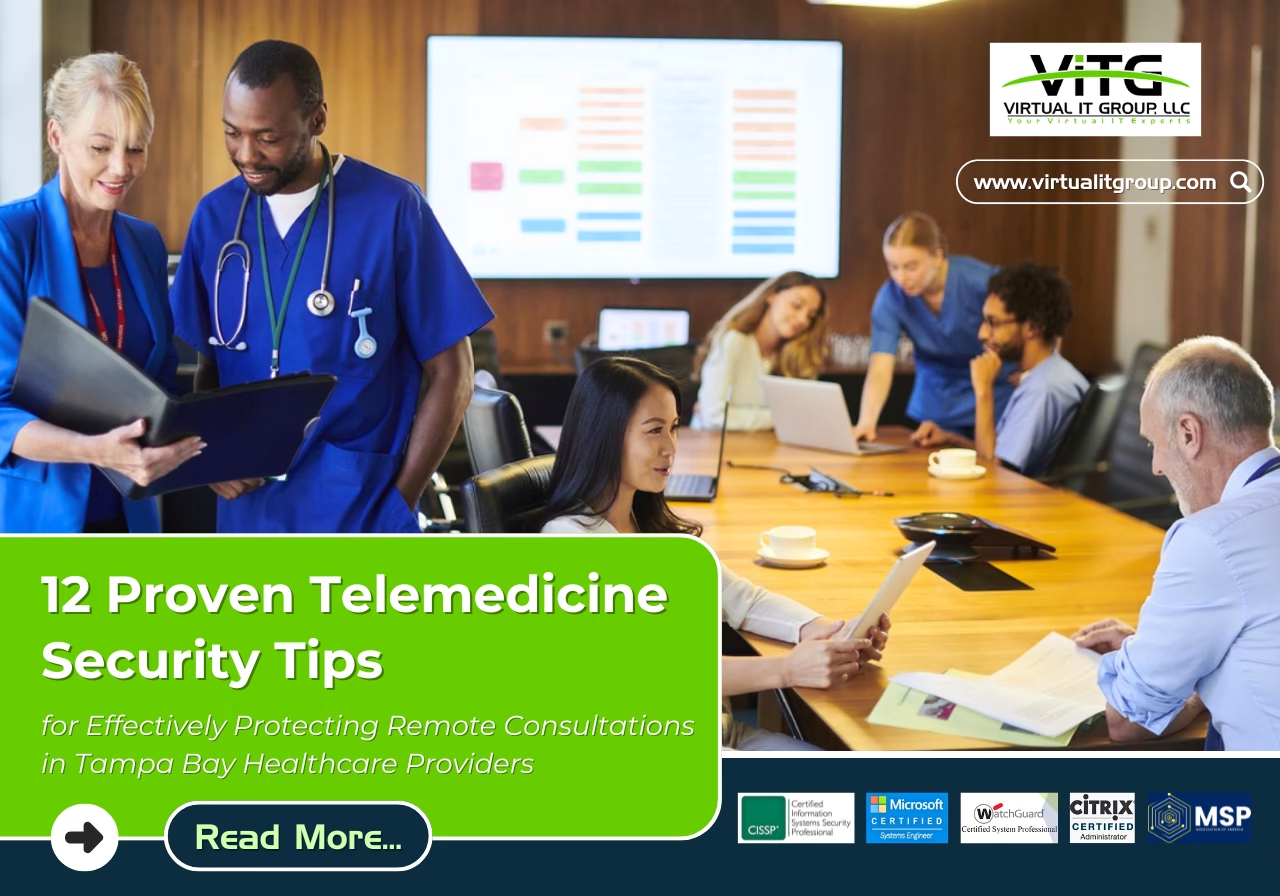As healthcare becomes increasingly digital, telemedicine has revolutionized patient care, offering convenient remote consultations and broader access to healthcare services. However, while telemedicine offers immense benefits, it also introduces new cybersecurity risks that healthcare providers must address. For Tampa Bay healthcare providers, safeguarding patient data and ensuring compliance with HIPAA (Health Insurance Portability and Accountability Act) regulations are critical in maintaining confidence and securing sensitive information.
As healthcare organizations increasingly adopt telemedicine, they must tackle new and complex security challenges. Cybercriminals, including groups like Scattered Spider, are targeting healthcare providers, looking to exploit any vulnerabilities in telemedicine platforms. With the right cybersecurity measures and managed IT services, Tampa Bay healthcare providers can ensure that their remote consultations remain secure, patient data stays protected, and compliance is met.
In this article, we’ll explore 12 Proven Telemedicine Security Tips to help Effectively Tampa Bay healthcare providers enhance telemedicine security and protect their telemedicine systems from emerging threats. These tips not only secure patient data but also help maintain the integrity and reliability of telemedicine platforms.
Why Telemedicine Security is Crucial for Healthcare Providers
The growth of telemedicine in Tampa Bay has fundamentally changed how healthcare is delivered. It offers convenience and accessibility, allowing patients to consult with their doctors from the comfort of their homes. Despite the numerous advantages, there are significant cybersecurity challenges involved, especially regarding patient privacy, data security, and compliance with HIPAA regulations.
In the digital age, healthcare data is one of the most valuable assets, making it a prime target for cybercriminals. For Tampa Bay healthcare providers, securing telemedicine platforms is no longer optional—it’s essential for protecting patient data, ensuring compliance, and preventing disruptions to patient care.

12 Proven Telemedicine Security Tips for Effectively Protecting Remote Consultations in Tampa Bay Healthcare Providers
Why Healthcare Providers are Prime Targets
In 2025, cybercriminals are shifting their focus to healthcare systems because of the wealth of valuable data they house. Tampa Bay healthcare providers must take a proactive approach to secure their telemedicine systems before they become the next victim of data breaches, ransomware attacks, and other cybersecurity threats.
A data breach can lead to:
- Regulatory fines for non-compliance with HIPAA.
- Reputation damage and loss of patient trust.
- Financial losses due to system downtime and recovery costs.
The requirement to protect telemedicine systems has never been more urgent. By integrating managed IT services, healthcare providers can protect both patient data and their overall business operations from the evolving cybersecurity landscape.
Emerging Threats: Scattered Spider Cyberattack Campaigns
One of the most alarming cybersecurity threats to the healthcare industry today comes from Scattered Spider, a cybercriminal group known for its sophisticated attack strategies. This group has expanded its attacks, now specifically targeting industries that store large amounts of sensitive data like healthcare and insurance.
Scattered Spider employs a combination of ransomware, social engineering, advanced persistent threats (APTs), and credential stuffing to infiltrate systems and steal valuable data. Their attacks are persistent and often target weaknesses in telemedicine platforms, looking to exploit vulnerabilities that could lead to a data breach or disruption in operations.
As the cyberattack landscape evolves, Tampa Bay healthcare providers must stay vigilant and implement the best cybersecurity practices to defend against groups like Scattered Spider.

12 Proven Telemedicine Security Tips for Effectively Protecting Remote Consultations in Tampa Bay Healthcare Providers
Top 12 Telemedicine Security Tips for Tampa Bay Healthcare
Tip #1: Use Multi-Factor Authentication (MFA)
Multi-Factor Authentication (MFA) is one of the most effective ways to secure telemedicine platforms. By requiring more than one form of verification, such as a password and a one-time code sent to a mobile device, MFA prevents unauthorized users from accessing patient data, even if their credentials are compromised.
Tip #2: Implement Strong Encryption
Data encryption is a cornerstone of telemedicine security. End-to-end encryption ensures that all communications, including video consultations and shared documents, are secured and unreadable to any unauthorized parties. This safeguards patient data during every remote consultation and ensures compliance with HIPAA regulations.
Tip #3: Secure Cloud Infrastructure
Healthcare providers are increasingly adopting cloud-based systems to store patient data. Securing your cloud infrastructure is essential to ensure that sensitive information remains protected from unauthorized access. Make sure your cloud provider uses HIPAA-compliant infrastructure and that all data is encrypted.
Tip #4: Regular IT Audits
Performing regular IT audits helps identify vulnerabilities in your telemedicine platform. These audits should focus on network security, data access control, and compliance with HIPAA. Regular audits enable healthcare providers to spot potential risks and address them before they’re exploited by cybercriminals.
Tip #5: Cybersecurity Employee Training
Employee cybersecurity training is one of the most effective ways to prevent phishing attacks and data breaches. Regularly educating your staff about how to spot suspicious emails, maintain strong passwords, and handle sensitive data securely is essential to reducing risks and ensuring a secure telemedicine environment.
Tip #6: Secure Communication Platforms
Your telemedicine platform should include secure communication tools that are HIPAA-compliant. This includes video conferencing software that encrypts calls, authenticates users, and provides secure messaging features to prevent unauthorized access during remote consultations.
Tip #7: Monitor Telemedicine Systems 24/7
24/7 monitoring allows your IT team to detect potential threats as they arise and act immediately to prevent damage. Managed IT services help ensure that your telemedicine platform is under constant surveillance, looking for unusual behavior that may indicate an attempted attack or security breach.
Tip #8: Backup Your Data Regularly
Data backups are essential in the event of a ransomware attack or system failure. Ensure that critical patient data and telemedicine records are regularly backed up to a secure, encrypted location, so you can restore the data in case of a breach or other disruption.
Tip #9: Limit Access with Role-Based Control
Role-based access control (RBAC) ensures that only authorized personnel can access sensitive patient data. By restricting access based on roles within the organization, you reduce the risk of insider threats and limit the potential impact of data breaches.
Tip #10: Use a Comprehensive Security Framework
A comprehensive security framework includes firewalls, intrusion detection systems (IDS), endpoint protection, and data encryption. These measures work together to create a multi-layered defense against cyber threats targeting telemedicine systems.
Tip #11: Ensure HIPAA Compliance
HIPAA compliance is non-negotiable for healthcare providers, especially when offering telemedicine services. Ensure that your telemedicine platform uses secure storage for patient data, audits access logs, and employs encryption to safeguard patient information.
Tip #12: Plan for Cybersecurity Incidents
Prepare for potential cybersecurity incidents by developing a comprehensive incident response plan. This plan should detail the steps to contain a breach, notify affected parties, and restore data in the event of a ransomware attack or data breach.

12 Proven Telemedicine Security Tips for Effectively Protecting Remote Consultations in Tampa Bay Healthcare Providers
How VITG Managed IT Services Can Help
At Virtual IT Group (VITG), we provide comprehensive managed IT services personalized specifically for Tampa Bay healthcare providers. Here’s how we can help you protect your telemedicine platform:
- 24/7 Threat Monitoring: Our team provides real-time monitoring to detect potential threats and mitigate them before they can cause harm.
- Data Encryption & Backup: We ensure all patient data is encrypted and regularly backed up to secure cloud storage to prevent data loss.
- Compliance Assistance: We help you ensure your telemedicine system complies with HIPAA regulations, preventing potential fines and reputational damage.
- Employee Training: We offer regular cybersecurity training to educate your employees about the latest threats and best practices for data protection.
- Incident Response: In case of a cyberattack, our rapid response team is ready to handle the situation and restore your system to normal operations as quickly as possible.
Conclusion
In conclusion, telemedicine security is crucial for Tampa Bay healthcare providers to protect patient data, maintain HIPAA compliance, and secure remote consultations. The rise of cyberattacks from groups like Scattered Spider has made it more important than ever to implement strong security measures to safeguard your telemedicine systems.
By adopting the 12 actionable tips outlined in this article and partnering with VITG’s managed IT services, you can effectively protect your telemedicine platform and ensure it is secure, compliant, and resilient against cyber threats.
📅 Schedule your free consultation today: Book your call now and learn how VITG can help protect your telemedicine platform from cybersecurity threats.
Visit our website at www.virtualitgroup.com to learn more about our managed IT services. Alternatively, you can contact us directly by leaving your information below or maximizing our web chat feature for a real-time conversation with one of our experts. We’re here to provide you with customized IT support and ensure your business stays protected.
Frequently Asked Questions (FAQ’s)
How do managed IT services protect telemedicine platforms?
Managed IT services offer cybersecurity solutions, 24/7 monitoring, data encryption, and HIPAA compliance support to protect your telemedicine system from cyberattacks.
How can healthcare providers ensure HIPAA compliance for telemedicine?
By implementing data encryption, access control, and audit logs, managed IT services ensure that your telemedicine platform remains HIPAA-compliant.
What are the risks of not securing telemedicine platforms?
Without proper security, telemedicine platforms are vulnerable to data breaches, ransomware attacks, and regulatory penalties for non-compliance.
What are the most common cyber threats to telemedicine platforms?
The most common cyber threats include ransomware attacks, phishing, credential stuffing, data breaches, and advanced persistent threats (APTs). These attacks aim to steal sensitive patient data, disrupt healthcare operations, and demand ransom payments.
How do multi-factor authentication (MFA) and encryption protect telemedicine platforms?
MFA adds an extra layer of security by requiring multiple forms of verification, ensuring that unauthorized users cannot access the system. End-to-end encryption protects the transmission of patient data by making it unreadable to cybercriminals, safeguarding sensitive health information during consultations.
Why is HIPAA compliance crucial for telemedicine platforms?
HIPAA compliance ensures that healthcare providers meet the necessary legal standards for protecting patient health information (PHI). Compliance includes secure storage, encryption, and strict access controls to prevent unauthorized data access and avoid costly penalties.
How can Tampa Bay healthcare providers ensure their telemedicine platforms are secure from ransomware attacks?
Healthcare providers can implement regular data backups, strong network security protocols, multi-layered cybersecurity defenses, and incident response plans to quickly mitigate ransomware attacks. Proactive monitoring and continuous security updates are essential in keeping systems safe.
What role does employee training play in telemedicine cybersecurity?
Employee training helps staff recognize phishing attempts, use strong passwords, and follow cyber hygiene best practices. Regular cybersecurity awareness training can significantly reduce the risk of human error, one of the leading causes of security breaches.
How do cloud services help secure telemedicine data?
Cloud services can offer secure data storage, encrypted communication, and scalable infrastructure for telemedicine platforms. By using secure cloud solutions, healthcare providers ensure that patient data is protected while maintaining accessibility, scalability, and compliance with HIPAA.
What are the benefits of using a comprehensive cybersecurity framework for telemedicine platforms?
A comprehensive cybersecurity framework integrates multiple layers of security, including firewalls, intrusion detection systems (IDS), encryption, and endpoint protection. This ensures that all potential vulnerabilities are addressed and mitigates the risk of cyberattacks and data breaches.
How can role-based access control (RBAC) enhance telemedicine security?
RBAC ensures that only authorized personnel have access to sensitive patient data based on their roles. By restricting access, healthcare providers can prevent internal breaches and ensure that only those who need access to certain systems or data are allowed to do so.
What is the significance of securing communication platforms for telemedicine consultations?
Securing communication platforms ensures that video calls and data transmissions between patients and healthcare providers remain private and secure. Using HIPAA-compliant, encrypted video conferencing tools prevents unauthorized access to sensitive patient information during remote consultations.
How do VITG managed IT services help improve telemedicine security for healthcare providers?
VITG managed IT services offer 24/7 threat monitoring, data encryption, regular IT audits, employee cybersecurity training, and incident response services. Our tailored services ensure telemedicine platforms are secure, HIPAA-compliant, and equipped to handle evolving cyber threats.
Why should healthcare providers in Tampa Bay invest in proactive cybersecurity measures?
Proactive cybersecurity measures, such as real-time monitoring, secure communication, and data encryption, prevent potential cyberattacks before they disrupt operations. By investing in cybersecurity now, healthcare providers can protect patient data, avoid financial losses, and maintain patient trust.
What steps should Tampa Bay healthcare providers take if they experience a cyberattack on their telemedicine platform?
If a cyberattack occurs, providers should immediately isolate affected systems, identify the attack vector, and notify relevant authorities and stakeholders. Engaging with cybersecurity experts for a rapid response and restoring systems from secure backups is crucial to minimizing the damage and protecting patient data.
How can telemedicine providers ensure data protection during consultations?
Telemedicine providers can ensure data protection during consultations by using end-to-end encryption for video calls, securing communication channels, and implementing multi-factor authentication (MFA) for all user logins. Regular data backups and cloud storage security are also crucial to safeguard patient information.
What are the most common threats to telemedicine security in 2025?
The most common threats to telemedicine security in 2025 include ransomware attacks, phishing scams, advanced persistent threats (APTs), and credential stuffing. Cybercriminal groups, such as Scattered Spider, often target telemedicine platforms to exploit vulnerabilities and steal sensitive patient data.
How can healthcare providers secure telemedicine video consultations?
To secure telemedicine video consultations, healthcare providers must use HIPAA-compliant video conferencing software that includes end-to-end encryption. Additionally, the use of password protection, waiting rooms to control entry, and user authentication helps ensure that unauthorized individuals do not join the session.
What are the signs that a telemedicine system has been compromised?
Signs that your telemedicine system may have been compromised include sudden slowdowns in system performance, unexplained access to sensitive data, unauthorized logins, or unexpected software behavior. Regularly monitor system logs, review user access reports, and ensure that intrusion detection systems are in place to identify unusual activity.
How can healthcare providers ensure secure mobile access for telemedicine consultations?
Healthcare providers can ensure secure mobile access by implementing mobile device management (MDM) software to enforce security policies. It’s important to use virtual private networks (VPNs), strong passwords, and MFA to protect mobile devices that are used for telemedicine consultations.
Are there telemedicine platforms specifically designed for enhanced security?
Yes, there are telemedicine platforms specifically designed to meet high-security standards, such as Doxy.me and VSee. These platforms are HIPAA-compliant and integrate end-to-end encryption and secure authentication methods to protect patient data during consultations.
Can telemedicine platforms be fully protected from cyberattacks?
While no system can be 100% hack-proof, healthcare providers can significantly reduce the risk of cyberattacks by implementing a multi-layered cybersecurity strategy, conducting regular IT audits, and using comprehensive encryption. Regular updates and continuous employee training also play crucial roles in enhancing security.
What should healthcare providers do to prepare for a cyberattack on their telemedicine system?
Healthcare providers should have a cybersecurity incident response plan in place, which includes immediate steps to contain the attack, notify affected parties, and recover lost data. Key steps should include isolating compromised systems, change passwords, and restore data from secure backups.
How can telemedicine platforms balance ease of use with security?
While usability is important, healthcare providers can balance ease of use with security by selecting user-friendly platforms that prioritize security features such as single sign-on (SSO), encrypted messaging, and MFA. Conducting regular training ensures that both staff and patients understand how to use these systems securely.
How do ransomware attacks affect telemedicine systems?
Ransomware attacks can lock healthcare providers out of their telemedicine systems, encrypting sensitive data and halting remote consultations. These attacks can result in data loss, financial losses, and regulatory fines if HIPAA compliance is violated. Protecting systems with backups and endpoint protection is crucial to mitigate these risks.
How often should telemedicine platforms be updated for security?
Telemedicine platforms should be updated regularly, preferably every month, to ensure security patches are applied and vulnerabilities are addressed. Any new software updates or changes to the system must be tested thoroughly to avoid potential security gaps.

